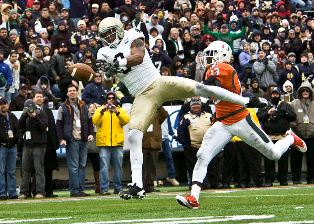
|
One of the problems with NCAA enforcement is that there are too many causes to simply punish players, coaches and schools and then assume the issue will be solved. We have a system that asks teenagers to voluntarily comply with a very complex set of rules, but we simultaneously tacitly allow them to grow up as heroes to whom the rules do not apply.
Many players can make the instant transition from high school hero to highly regulated college player in part because they have the support system from home or otherwise. But a few are game changers that make millions for the school, and NCAA rules violations can easily cost millions in lost profits. I have previously suggested pro players as institutionalized mentors. I also recommended that opportunities for sports-related jobs be afforded to those players as incentives and a reward for staying infraction-free.
Now if those remedies are ineffective, and a player has already been suspended but with a chance to return, or has repeatedly violated team rules or otherwise appears headed down the wrong road, it seems a self-fulfilling strategy of doom to wait until you have yet another infraction that could sink the program, and the staff. I have a suggestion that will be confirmation that I am crazy, or at least desperate for solutions.
We have too long used excuses for lax player accountability. We know there are not enough NCAA investigators to monitor every program. Of course, coaches and staff cannot monitor 24-7. But technology can.
Nongovernmental organizations traced over 600,000 people in Haiti who were survivors of an earthquake and cholera. They wanted to better target where to send supplies. They tracked mobile phone usage to satellite and tower locations. If we can track over a half million people with phones, I think we can also track a few hundred players. We know they have phones. We know they would rather travel without underwear than without their mobile devices. The university can have a computer tech student sitting in a cubical tracking the player and plotting for an interception before the bouncer asks for the player's ID. There would be no need to ask and guess "where were you last night?" You notice I am only proposing this for the already risk-laden. It is a better catch the person early as oppose to waiting for on an iPhone video showing the player stomping someone in the face.
Say a star quarterback has a suspended license. If a player loves his car, and loves the bars more, a web cam and GPS is the perfect gift. You can't even start the car in some technology-savvy probationary circles unless permission is granted. Google Maps can swoop down and video-tackle a teenager on the loose at the driveway of a Ponzi-schemer. Then before the violations can occur, the search and seizure is executed.
There is an understandable concern about a stigma of criminality. But players already have to sign a waiver giving away many legal rights when agreeing to be a scholarship student-athlete. This is just one more. There is no unconstitutional invasion of privacy under the Fourth Amendment if there is un-coerced consent. And the frenzy created by presumed guilt already seen any time a player is alleged to have broken the law is more vexing to the player than the suspended license he received. There are constitutional issues that typically involve balancing the individual's interests against governmental/educational interests. NCAA infractions of one player affect many other innocents and the institution's reputation, revenues that subsidize other sports and jobs. There is a plausible governmental justification for these individual restraints, especially if narrowly confined to repeat offenders. Tethering is not out of the question. Let Nike start making fashionable ankle bracelets. Why not use a fraction of EA Sports video profits or ESPN's TV contracts that bombard youth with "Fly with the Ank" commercials as the newest star dunks or snags a pass. I've seen worse become all the rage. I am only half-joking.
Notre Dame is playing by the old rules. Star receiver Michael Floyd could have turned pro last year and become an instant millionaire. He decided instead to return for his senior year. Bored without homework in late spring, he had a little alcohol to pass the time – and then took a spin. After police took exception to the order of his actions, the university remedy was to suspend, reinstate and suggest or require that he move back into a dorm this fall for monitoring. That may be sufficient for an isolated lapse of judgment. But this was Floyd's third alcohol-related offense in two years. Notre Dame would know better than I, but if I had someone who has caught more footballs than anyone in Notre Dame history on my team, I would rather quietly over-monitor than risk being undermanned at receiver and lose about the only major proven playmaker on the squad.
Where would the money come from for an aggressive state-of-the-art monitoring program? Between the schools, the conference, the NCAA, corporate sponsors and all those companies that profit off those players, there is plenty of cash. Private, for-profit companies ought to voluntarily or involuntarily give back part of their considerable earnings they make from the sport to help the sport.
This is a remedy of last resort. Before this should be attempted, schools must deal with the bad behavior of dangerous individuals who buzz around major sports programs. There are adults that provide the incentives for players to come to the schools and stay at the schools that violate NCAA rules. They are closer to the root cause of the problem. But that is the topic of another article. Stay tuned.










